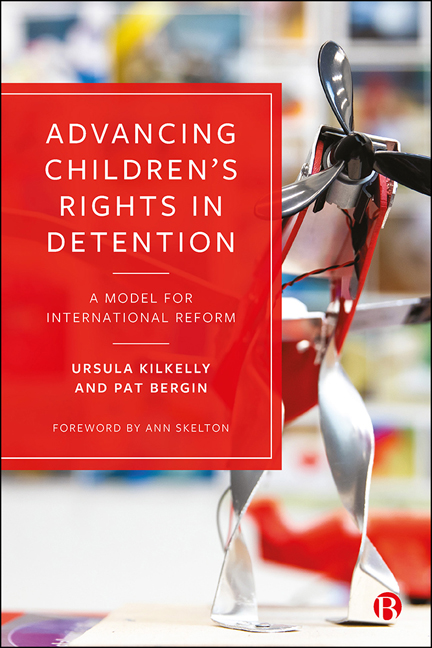Book contents
- Frontmatter
- Contents
- List of Cases and Instruments
- List of Figures
- About the Authors
- Acknowledgements
- Foreword
- Introduction
- 1 Children’s Rights in Detention
- 2 An International Perspective
- 3 Irish Youth Justice Law and Policy
- 4 Introducing Child Detention in Ireland
- 5 Oberstown and the Process of Change
- 6 Implementing Children’s Rights in Detention
- 7 Children’s Rights to Protection from Harm
- 8 Staff Wellbeing and Communication
- 9 International and National Influences and Advocacy
- 10 Reflections: Enablers and Barriers to Reform
- Afterword
- References
- Index
3 - Irish Youth Justice Law and Policy
Published online by Cambridge University Press: 13 May 2022
- Frontmatter
- Contents
- List of Cases and Instruments
- List of Figures
- About the Authors
- Acknowledgements
- Foreword
- Introduction
- 1 Children’s Rights in Detention
- 2 An International Perspective
- 3 Irish Youth Justice Law and Policy
- 4 Introducing Child Detention in Ireland
- 5 Oberstown and the Process of Change
- 6 Implementing Children’s Rights in Detention
- 7 Children’s Rights to Protection from Harm
- 8 Staff Wellbeing and Communication
- 9 International and National Influences and Advocacy
- 10 Reflections: Enablers and Barriers to Reform
- Afterword
- References
- Index
Summary
Introduction
Article 4 of the United Nations Convention on the Rights of the Child (CRC) requires that state parties adopt all appropriate legislative, administrative and other measures to implement children's rights and research has shown that these measures combine to enhance children's lived experiences of their rights (Kilkelly et al, 2021). As the international children's rights standards make clear, child detention does not exist in a vacuum, but rather is part of the national response to children who come into conflict with the law. In this regard, this chapter traces the development of Irish law and policy in the area of youth justice, from a history of institutionalized care to a more progressive, rights-based approach. The chapter begins with a brief history of the Irish youth justice system, identifying the reforms that gave rise to the contemporary legislative framework. Administrative responsibility for youth justice is outlined and the policy developments and priorities are set out. The chapter ends with some conclusions about the nature of the Irish youth justice system, highlighting the importance of ensuring that the law and policy platform, on which detention is based, must itself be rights-based in order to advance children's rights.
Irish youth justice – a brief history of reform
By most standards, Ireland is considered to have a mainly progressive approach to youth justice that largely coheres with international standards of children's rights (Kilkelly, 2006). An overhaul of the legislative framework took place during the 1990s, coinciding with Ireland's ratification of the CRC in 1992 and following several decades of parliamentary review and inquiry into the child welfare, reformatory and industrial school systems (Sargent, 2016). The Children Act 1908, considered the beginning of Ireland's approach to youth justice, had endured for more than a century due to its ‘enlightened’ and ‘flexible’ nature (Kilkelly, 2006, p 25) and a recognition of the need to rehabilitate young offenders and avoid exposing them to the full power of the criminal justice system served Ireland well. The 1908 Act placed limits on the nature and length of custodial sentences, emphasized non-custodial punishments and provided for summary trial for most offences, with protections in place for the privacy of children in conflict with the law.
- Type
- Chapter
- Information
- Advancing Children's Rights in DetentionA Model for International Reform, pp. 35 - 49Publisher: Bristol University PressPrint publication year: 2021



